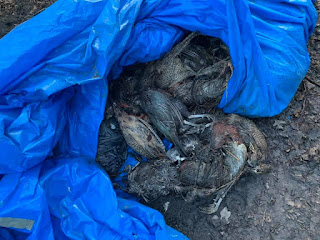The last two weekends have given me the opportunity to do something that really motivates and inspires me; engagement.
Hen Harrier Day 2019
Last weekend was Hen Harrier Day organised by the Wild Justice team. You can read more about this year's Hen Harrier Day here. It was of course a fantastic opportunity to celebrate this iconic species and talk with a real mix of people about how to further increase the awareness of illegal persecution and what are the next "bold" moves needed to ensure future Hen Harrier Days (and we are talking 5 - 10 years here) can be a pure celebration and not dominated by the on going illegal activity.
................................
Last year I was on a National Trust debating panel at the Blenheim Place Countryfile Live event and I was delighted to be invited back this year for the event at Castle Howard in Yorkshire, which I attended yesterday.
The show ground had already had 2 days of cars and feet, so the mud was no surprise, but I hadn't expected such a colourful reception.
The theme for this years National Trust talks and debates was "nature needs me" and the debate I was participating in was titled "Young People Are The Answer". The information given about the debate was as follows:
Climbing trees and getting muddy knees are memories from childhood we all treasure, but are they increasingly becoming experiences of the past? Recent research suggests that only 1 in 5 children have a ‘connection to nature’. Time spent playing outdoors has halved in just one generation.
But that’s not the full picture as we’ve seen this year…with events such as the schools’ climate strikes. Many of our nation’s youth are passionate about the planet, the climate, the environment. They want us to leave them a planet that can support them in the future. So how can we harness that enthusiasm and build connectedness with nature?
Young people are the answer. Many of our nation’s youth are passionate about the planet, the climate, the environment. Climbing trees and getting muddy knees are memories from childhood we all treasure, but are they increasingly becoming experiences of the past?
Presenter: Charlotte Smith
Panel:
Lindsey Russell - Blue Peter Presenter
Findlay Wilde – Young Conservationist
Gemma Jones - Green Academies Project
Helen Kaye Bourne - Action For Conservation
India Ashfield – Wildlife Trust
The debate actually started with a great ice-breaker question about the level of confidence we have in people in power to protect the environment. We then went on to speak about our feelings about Greta Thunberg's climate strikes and the more extreme actions taken by Extinction Rebellion. Of course we covered the topics of how to engage with young people and the fact that they are the generation that will be most impacted by climate change.
It was a fascinating debate and whilst we agreed on most things, there were some areas I was not quite in agreement on. For example, the action taken by Extinction Rebellion has certainly helped put pressure the government to declare a climate emergency, but it also turned many people off the main message, as the media talked more about the disruption and managed to put a real negative spin on what was happening. I more and more believe in collaborative working and it is really important to take people with you and not alienate yourself from the people you need on side (both now and in the future).
We all agreed on the importance of climate related issues being taught in school to all ages to ensure the generations coming through have the knowledge to make better life choices as they get older. It should also be a hands on experience to ensure children actually feel that connection with nature and don't suffer from "the lost years" as they move into secondary school. However, I feel that it is just as important to reach out and educate all generations if we want to achieve the big changes needed; just look at the difference the Blue Planet series made to plastic awareness.
Some of the really interesting thoughts and learnings came on the back of the audience questions towards the end of the session. In fact, we ran over quite significantly due to the engagement of the audience and the desire to discuss as many points raised as possible.
It was inspiring to see how many youngsters in the audience had their hands up wanting to ask questions. Their questions were well thought out and came from a real desire to do something to protect the planet. I hope they head back to school in September and put into place some of the advice given - I'm pretty sure there is one school in particular that will be going all out for a Blue Peter green badge!
But the most poignant moment for me during the session, and the one that I have reflected on the most since the debate, was an observation made by a more senior member of the audience. He asked whether or not the under 25s should change their language to avoid a "them and us" situation between generations. He felt that there was almost a blame being put on his generation and that whilst the younger generations may be more aware then ever before about climate change, they do not have all the answers.
On reflection, it was an excellent observation and of course young people are just part of the answer. There is a real boldness coming through in the language and actions of the under 25s, but there is experience, knowledge and influence to be found across the generations. No individual generation is solely responsible for the state of the planet and no individual generation can reverse the crisis. Yes we need to be bold in our actions, but we also have to be inclusive.
We're all in this together after all.








